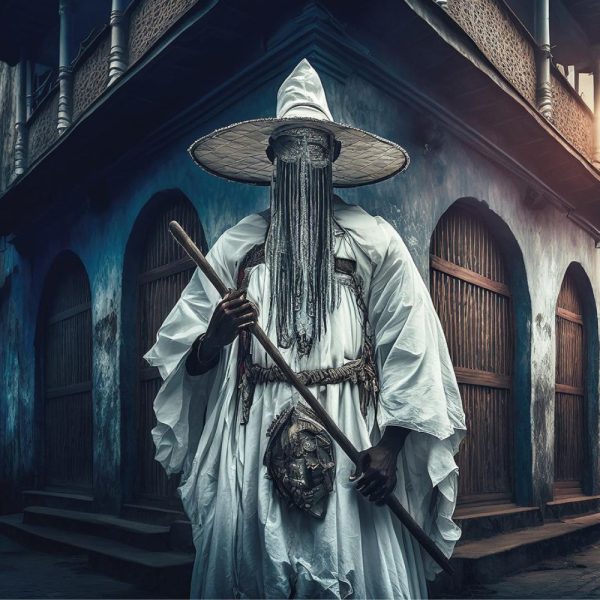Eyo masquerade, also known as Adamu Orisa Play, is a prominent cultural and traditional festival in Yoruba culture.
It is considered one of the oldest masquerade traditions in Nigeria and is deeply rooted in Yoruba cultural beliefs and practices.
There are two types of Eyo masquerade: the Adimu Orisa and the Eyo Olokun. The Adimu Orisa Eyo is believed to represent the spirits of the dead, while the Eyo Olokun is associated with the sea god Olokun. Both types of Eyo masquerade have unique roles and symbolic significance in Yoruba culture.
The Eyo masquerade is usually made up of a group of people wearing white robes, with their faces and heads covered by a mask made from papier-mâché or cloth. They carry long sticks and wear hats with brightly coloured tassels. They move slowly and gracefully, with each step accompanied by the rhythmic sound of a drum.
Eyo masquerades come out during special events and occasions such as the burial of an important Yoruba chief or king, the installation of a new chief, or during the annual Eyo festival, which is held in Lagos. The Eyo festival is a major event that attracts visitors from all over Nigeria and beyond. During the festival, the masquerades dance and perform in the streets, accompanied by drumming and singing.

The Eyo masquerade has several taboos associated with it. For example, women are not allowed to look at the masquerade, and it is considered disrespectful to touch or speak to the masquerade while it is performing. Additionally, it is believed that the masquerade brings bad luck to anyone who sees it without permission, so it is important to seek permission before viewing the masquerade.
In Yoruba culture, the Eyo masquerade is believed to represent the spirits of the dead, and its appearance is seen as a sign of respect for the ancestors. The masquerade is also believed to bring good luck and blessings to the community, and its appearance is seen as a symbol of unity and solidarity among the people. Overall, the Eyo masquerade is an important and deeply symbolic tradition in Yoruba culture.
In terms of depictions in society and in films, the Eyo masquerade has been portrayed in various ways. In Yoruba society, the masquerade is usually depicted as a revered figure, and its appearance is seen as a sign of respect for the ancestors. During the annual Eyo festival in Lagos, drumming and singing accompany the masquerades, and the streets are usually filled with people who come to watch the performance.
In films, the Eyo masquerade has been portrayed in various ways. In some movies, the masquerade is depicted as a mysterious and mystical figure, while in others; it is portrayed as a symbol of tradition and cultural heritage. For example, in the Nigerian film ‘Eyo Festival’, the masquerades are depicted as powerful and revered figures, and the film highlights the importance of the festival in Yoruba culture.
Overall, the Eyo masquerade has played an important role in Yoruba culture for centuries, and its myths and depictions in society and in films have helped to promote and preserve the cultural heritage of the Yoruba people.



